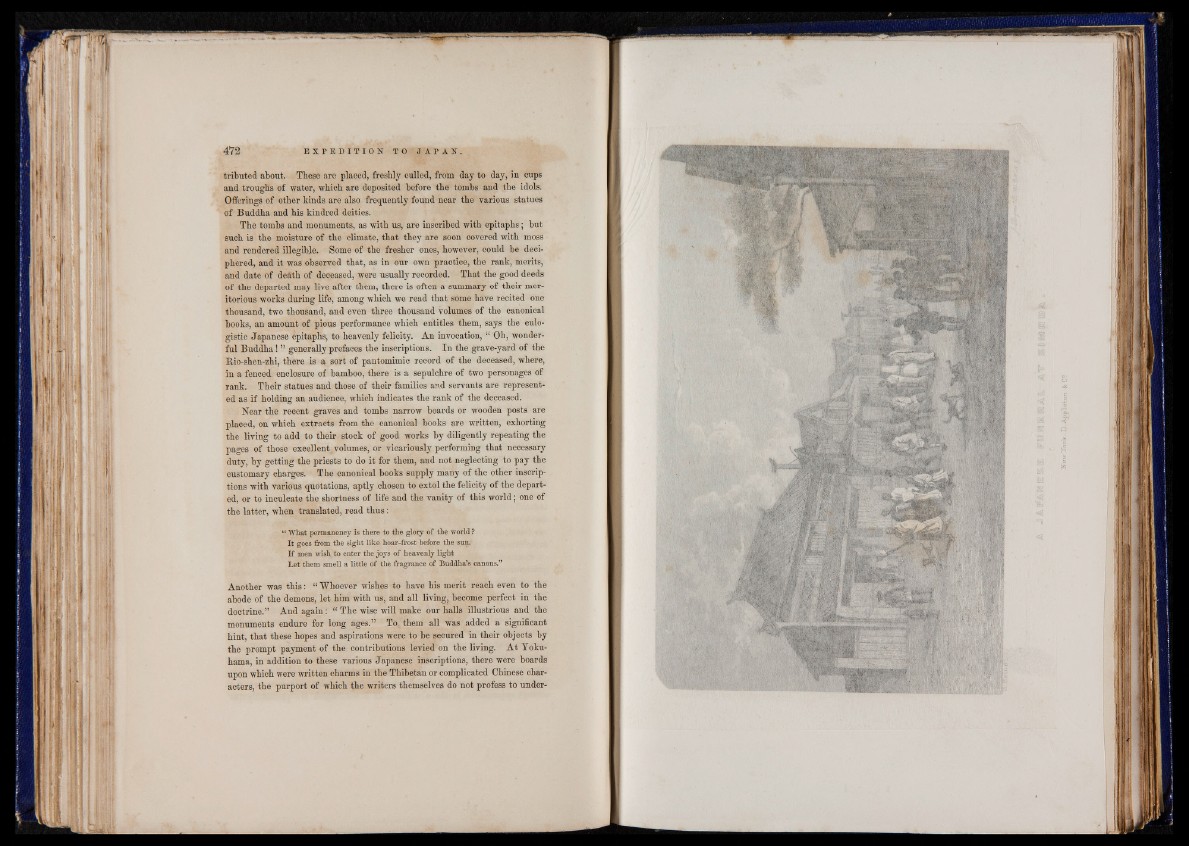
472 E X P E D I T I O N TO J A P A N .
tributed about. These are placed, freshly culled, from day to day, in cups
and troughs of water, which are deposited before the tombs and the idols.
Offerings of other kinds are also frequently found near the yarious statues
of Buddha and his kindred deities.
The tombs and monuments, as with us, are inscribed with epitaphs; but
such is the moisture of the climate, that they are soon covered with moss
and rendered illegible. Some of the fresher ones, however, could be deciphered,
and it was observed that, as in our own practice, the rank, merits,
and date of death of deceased, were usually recorded. That the good deeds
of the departed may live after them, there is often a summary of their meritorious
works during life, among which we read that some have recited one
thousand, two thousand, and even three thousand volumes of the canonical
books, an amount of pious performance which entitles them, says the eulogistic
Japanese epitaphs, to heavenly felicity. An invocation, “ Oh, wonderful
Buddha! ” generally prefaces the inscriptions. In the grave-yard of the
Bio-shen-zhi, there is a sort of pantomimic record of the deceased, where,
in a fenced enclosure of bamboo, there is a sepulchre of two personages of
rank. Their statues and those of their families and servants are represented
as if holding an audience, which indicates the rank of the deceased.
Near the recent graves and tombs narrow boards or wooden posts are
placed, on which extracts from the canonical books are written, exhorting
the living to add to their stock of good works by diligently repeating the
pages of those excellent volumes, or vicariously performing that necessary
duty, hy getting the priests to do it for them, and not neglecting to pay the
customary charges. The canonical hooks supply many of the other inscriptions
with various quotations, aptly chosen to extol the felicity of the departed,
or to inculcate the shortness of life and the vanity of this world; one of
the latter, when translated, read thus:
“ What permanency is there to the glory of the world ?
I t goes from the sight like hoar-frost before the sun.
If men wish to enter the joys of heavenly light
Let them smell a little of the fragrance of Buddha’s canons.”
Another was this: “ Whoever wishes to have his merit reach even to the
abode of the demons, let him with us, and all living, become perfect in the
doctrine.” And again: “ The wise will make our halls illustrious and the
monuments endure for long ages.” To. them all was added a significant
hint, that these hopes and aspirations were to be secured in their objects by
the prompt payment of the contributions levied on the living. At Yoku-
hama, in addition to these various Japanese inscriptions, there were hoards
upon which were written charms in the Thibetan or complicated Chinese characters,
the purport of which the writers themselves do not profess to under-
I S W l i
km SS KS B SM Bm U ■ i t
M R
w iw m
I
v H
M i
I S
V J IM I f
i i B s ®
M g j $ £
f l i * I
I S ! » ffl B ^ A • & SW IS f i
W i m .
i S | l |
RaHKnllii